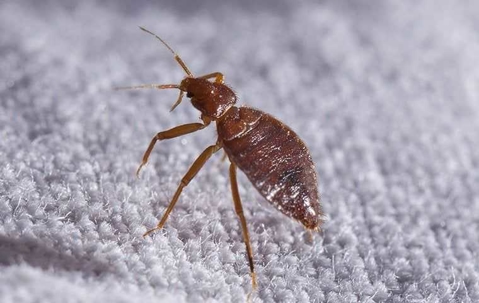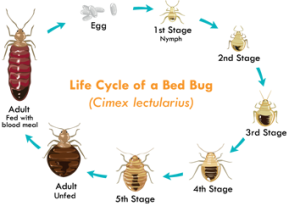Professional Kings Bug Control Cincinnati: Your Relied On Pest control experts
Professional Kings Bug Control Cincinnati: Your Relied On Pest control experts
Blog Article
A Break Down of the Numerous Types of Bug Control Solutions
In the world of insect control, a wide variety of techniques exist to battle the existence and resolve of undesirable creatures. From the standard use chemical pesticides to much more ingenious organic control solutions, each strategy uses unique benefits and constraints. As we browse via the diverse landscape of insect control options, understanding the intricacies of each approach becomes vital in identifying the most efficient strategy. Stay tuned as we discover the nuanced world of insect control methods and uncover how each type plays a special duty in securing our settings.
Chemical Pesticides
Chemical chemicals are generally made use of in parasite control to properly get rid of a wide variety of insects and other bugs. These chemicals function by targeting the worried system of the parasites, interrupting their regular features, and ultimately leading to their demise. Using chemical pesticides has been a staple in the insect control market for decades because of their effectiveness and quick results.

However, it is crucial to utilize chemical pesticides with care due to their possible hazardous results on the environment and non-target varieties. Incorrect application or overuse of these chemicals can lead to contamination, harm to useful pests, and resistance advancement in parasite populations. For that reason, it is crucial to comply with safety and security standards and policies when utilizing chemical pesticides for parasite control.
Biological Control Methods
Considering the prospective environmental influences and threats connected with chemical pesticides, organic control approaches supply an even more lasting technique to handling bug populations. Organic control involves using all-natural adversaries, such as predators, virus, and bloodsuckers, to suppress parasite populaces. This technique is typically much more targeted, affecting just the certain insect species while decreasing injury to useful bugs, humans, and the setting.

One advantage of organic control is its lasting effectiveness. When developed, all-natural adversaries can help control pest populations constantly without the demand for repeated applications of chemicals. Furthermore, organic control is often much more economical and can aid lower chemical resistance in pest populations over time. In general, organic control techniques provide a ecologically friendly and lasting solution to pest management.

Mechanical Insect Control
Mechanical insect control involves the physical manipulation or elimination of bugs to manage their populations properly. This technique is commonly utilized in conjunction with various other parasite control techniques for comprehensive bug management. One common example of mechanical pest control is making use of catches to catch insects or rats. These traps can be set up in critical areas where pests are known to dwell, helping to minimize their numbers.
Another mechanical method is making use of obstacles such as fencings, nets, or screens to block insects from getting in certain areas. By literally stopping parasites from accessing a location, the probability of invasions or damage can be significantly minimized. Furthermore, manual approaches like bed bug spray handpicking parasites off frameworks or plants can be effective for smaller-scale invasions.
While mechanical pest control methods can be labor-intensive, they use a non-chemical option that can be ecologically pleasant and sustainable. By targeting insects straight, mechanical control techniques can help maintain parasite populations in check without counting on pesticides.
Natural Treatments
Using natural remedies for parasite control offers a lasting and environmentally friendly strategy to taking care of bug populations without resorting to chemical interventions. Natural remedies involve making use of substances acquired from plants, minerals, or various other naturally happening resources to hinder or get rid of bugs.
In addition, essential oils such as tea tree oil or neem oil have insecticidal properties that can effectively manage pests while being safe for the atmosphere. One more all-natural treatment is introducing valuable insects like ladybugs or hoping mantises to your garden to prey on unsafe bugs. By integrating these all-natural services right into pest monitoring techniques, people can lower their reliance on artificial chemicals and advertise a much healthier, a lot more well balanced ecological community.
Integrated Parasite Monitoring
Integrated Insect Monitoring (IPM) is an extensive method that incorporates different approaches to effectively manage pest populations while minimizing risks to human health and the environment. IPM includes the combination of numerous pest control techniques such as organic control, environment manipulation, modification of cultural techniques, and the usage of resistant plant varieties. By utilizing a mix of these methods, IPM intends to lower reliance on chemical pesticides, which can have negative influence on communities and human wellness.
One trick aspect of IPM is the focus on prevention. By carrying out procedures to stop pest infestations before they happen, such as preserving appropriate sanitation and sealing entry points, the demand for responsive bug control actions is lessened. Tracking and regular evaluations play a critical duty in IPM, enabling early discovery of parasite problems and punctual treatment.
Final Thought
In final thought, the numerous types of insect control remedies offer a variety of alternatives for effectively handling bug infestations. Biological control techniques make use of all-natural predators to control bugs. Integrated Parasite Management combines several methods for an all natural approach to pest control.
Chemical pesticides are frequently utilized in parasite control to effectively eliminate a broad find out variety of bugs and various other parasites.Mechanical parasite control involves the physical manipulation or removal of insects to manage their populations efficiently (Kings cincinnati pest control).Utilizing all-natural solutions for parasite control offers a eco-friendly and lasting strategy to managing parasite populations without resorting my link to chemical treatments.Integrated Parasite Administration (IPM) is an extensive approach that combines different strategies to effectively manage pest populaces while lessening risks to human health and the setting.In verdict, the different types of pest control solutions supply a variety of options for effectively taking care of bug infestations
Report this page